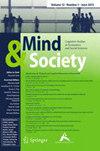社交媒体与身份形成——自我呈现与社会比较的影响
Q1 Arts and Humanities
引用次数: 0
摘要
对于今天的年轻人来说,媒体和技术是主要的社交元素,他们在日常生活中花了很大一部分时间在社交媒体上交谈。根据Rideout(2010)的研究,经常使用媒体的年轻人有很多朋友,和父母相处得很好,对学校和机构也很满意。那些经常使用媒体的人也说他们陷入了很多麻烦,经常心烦意乱或不开心,经常感到无聊。随着个人在社交网站上的花费增加,他们与他人的线下联系减少了,这意味着他们的大部分社交活动和社交活动都是在屏幕的光芒下进行的。因此,社交媒体有可能影响个人的心理健康,尤其是青少年,还可能影响身份的建立,改变人们对自己和他人的看法。人们无需亲自见面,就可以利用社交网络创建身份并与他人交流。它为发展一种一致的、稳定的、有意义的自我意识提供了机会和障碍。本文阐述了社交媒体对年轻人自我表现、社会比较和自尊的影响,以及它如何影响他们的身份建构。在当今的技术环境中,大多数关于社交网站的研究都集中在其不良影响上。然而,本文侧重于社交媒体的积极方面,以及它如何帮助形成身份。本文章由计算机程序翻译,如有差异,请以英文原文为准。
Social Media and Identity Formation – The Influence of Self-Presentation and Social Comparison
For today’s youth, media and technology are major social elements, and they spend a substantial
portion of their daily lives conversing via social media. According to Rideout (2010), youth that use the
media regularly have a large number of friends, get along well with their parents, and are pleased with
their schools and institutions. Those that use the media frequently also say that they get into a lot of
trouble, are frequently upset or unhappy, and are frequently bored. Individuals’ offline contacts with
others decline as their spending on social networking sites increases, meaning that the majority of their
socialising and sociability occurs in the glow of a screen. As a result, social media has the potential to
influence an individual’s psychological well-being, particularly among teens, as well as identity building,
modifying how people see themselves and others. Without needing to meet in person, people can utilise
social networking to create an identity and communicate with others. It offers both chances and obstacles
for developing a consistent, stable, and meaningful sense of self. The paper elucidates the impact of
social media on young people’s self-presentation, social comparison, and self-esteem, as well as how it
affects their identity construction. In today’s technology environment, most studies on social networking
sites have focused on the bad effects. However, this paper focuses on the positive sides of social media
and how it aids in the formation of identity.
求助全文
通过发布文献求助,成功后即可免费获取论文全文。
去求助
来源期刊

Mind and Society
Arts and Humanities-Philosophy
CiteScore
2.30
自引率
0.00%
发文量
5
期刊介绍:
Mind & Society is a journal for ideas, explorations, investigations and discussions on the interaction between the human mind and the societal environments. Scholars from all fields of inquiry who entertain and examine various aspects of these interactions are warmly invited to submit their work. The journal welcomes case studies, theoretical analysis and modeling, data analysis and reports (quantitative and qualitative) that can offer insight into existing frameworks or offer views and reason for the promise of new directions for the study of interaction between the mind and the society. The potential contributors are particularly encouraged to carefully consider the impact of their work on societal functions in private and public sectors, and to dedicate part of their discussion to an explicit clarification of such, existing or potential, implications.Officially cited as: Mind Soc
 求助内容:
求助内容: 应助结果提醒方式:
应助结果提醒方式:


